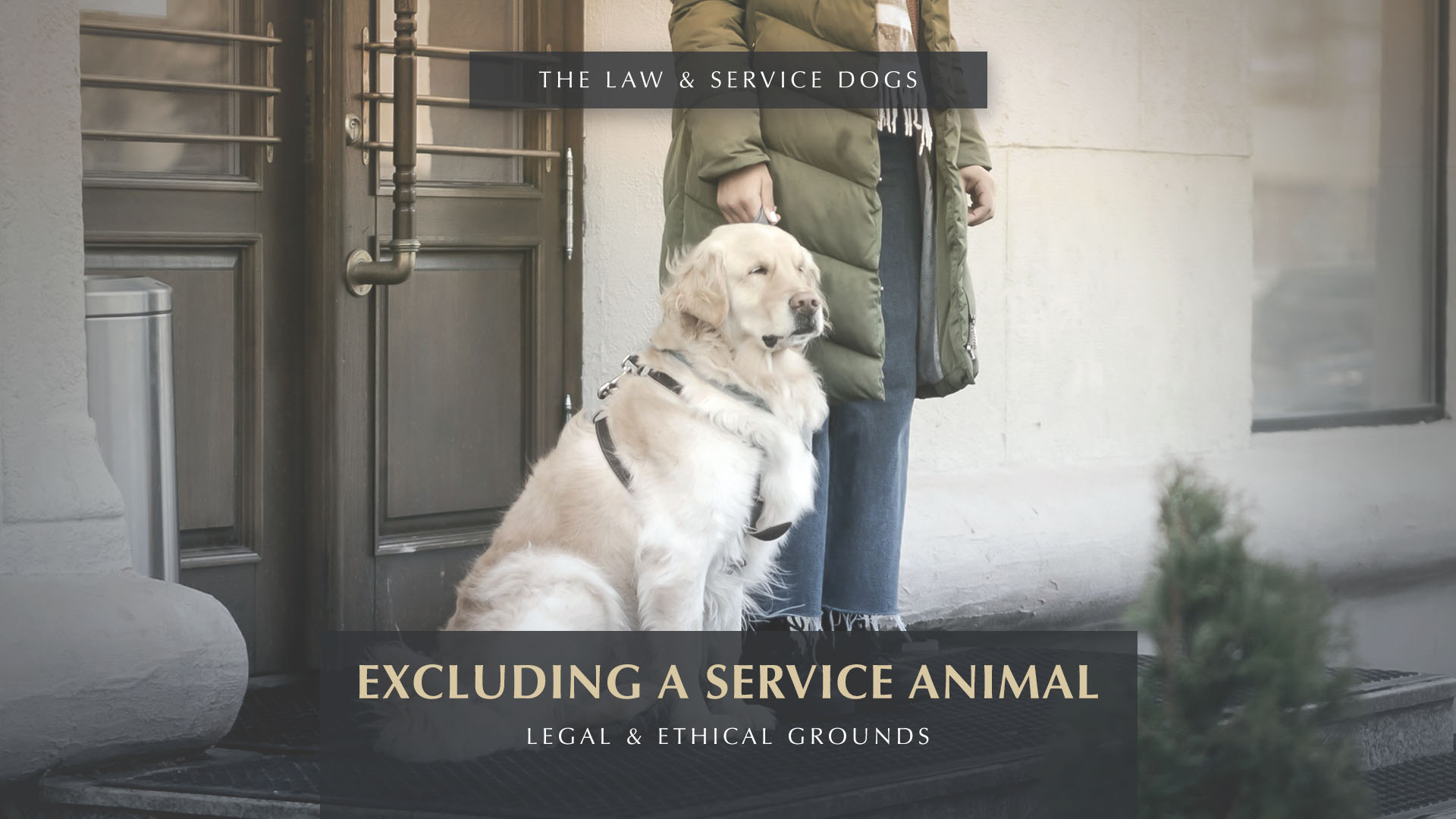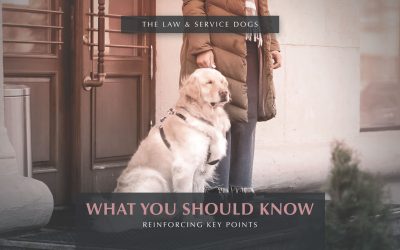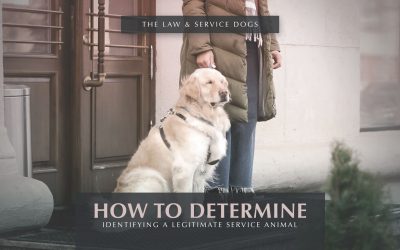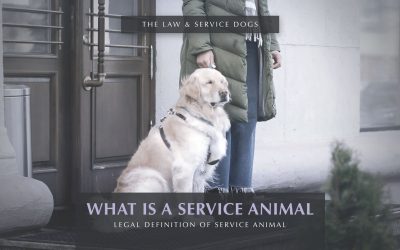Excluding a Service Animal: ADA Guidelines and What Businesses Need to Know
Under the Americans with Disabilities Act (ADA), individuals with disabilities have the right to be accompanied by their service animals in places of public accommodation.
However, there are specific circumstances under which a service animal may be excluded from a public space.
Understanding when exclusion is allowed and how it should be handled is crucial for both businesses and individuals with disabilities.
When Can a Service Animal Be Excluded?
Exclusions, Inquiries, Charges Related to Service Animals
Only limited inquiries are allowed when it is not obvious what service an animal provides. Staff may ask two questions:
- is the dog a service animal required because of a disability, and
- what work or task has the dog been trained to perform.
Staff cannot ask about the person’s disability, require medical documentation, require a special identification card or training documentation for the dog, or ask that the dog demonstrate its ability to perform the work or task.
- Allergies and fear of dogs are not valid reasons for denying access or refusing service to people using service animals. When a person who is allergic to dog dander and a person who uses a service animal must spend time in the same room or facility, for example, in a school classroom or at a homeless shelter, they both should be accommodated by assigning them, if possible, to different locations within the room or different rooms in the facility.
- A person with a disability cannot be asked to remove his service animal from the premises unless: (1) the dog is out of control and the handler does not take effective action to control it or (2) the dog is not housebroken. When there is a legitimate reason to ask that a service animal be removed, staff must offer the person with the disability the opportunity to obtain goods or services without the animal’s presence.
- Establishments that sell or prepare food must generally allow service animals in public areas even if state or local health codes prohibit animals on the premises.
- People with disabilities who use service animals cannot be isolated from other patrons, treated less favorably than other patrons, or charged fees that are not charged to other patrons without animals. In addition, if a business requires a deposit or fee to be paid by patrons with pets, it must waive the charge for service animals.
- If a business such as a hotel normally charges guests for damage they cause, a customer with a disability may also be charged for damage caused by himself or his service animal.
- Staff are not required to care for or supervise a service animal.
How Should a Business Handle Exclusion?
If a service animal is to be excluded from a public space, the business must handle the situation respectfully and in compliance with the ADA. The following steps should be followed:
- Explain the Reason for Exclusion: The business must provide a clear, non-discriminatory reason, such as uncontrolled behavior or the dog not being housebroken.
- Offer Alternatives: The individual with a disability may still be able to receive services or access the business after removing the animal from the premises.
- Avoid Stereotyping or Assumptions: Businesses must avoid making decisions based on stereotypes or generalizations about specific breeds. For example, they cannot exclude a dog simply because it’s a pit bull unless there is clear evidence of dangerous behavior. But that would apply to any breed.
If a business determines a service animal should be excluded, it should document the reasons for such an exclusion through a detailed contemporaneous note or – even better – by creating a video recording of the animal’s behavior prompting this exclusion. Such documentation would be beneficial should a formal complaint be filed against the business.
Beware of Fake Service Dog Registries
There is no officially recognized National Service Dog Registry in the United States. This is referenced explicitly in the ADA FAQ, Question 17. While various websites claim to offer service dog registration or certification, the Americans with Disabilities Act (ADA) does not require service animals to be registered or certified. The law only requires that a service animal be individually trained to perform tasks that assist with a disability.
Service animals do not need to have official certification or be listed in any registry to be recognized under the law. Additionally, service dog handlers are not required to carry documentation, although they may choose to do so for personal or convenience reasons.
Many of the websites offering service dog registration charge a fee but provide no legitimate certification or legal standing. The ADA makes it clear that businesses cannot require documentation or registration for service animals. These documents do not convey any rights under the ADA and the Department of Justice does not recognize them as proof that the dog is a service animal.
Resource: ADA Service Animals FAQ, Q17.
K9 Partners for Patriots Service Dog IDs and Certification – Supporting Veterans with Professional Training
K9 Partners for Patriots provides our Service Dog Team Graduates with IDs and Certification booklets to confirm their service dogs’ professional training. These documents support veterans’ access to public spaces and demonstrate the quality of training our dogs receive to assist with PTSD, TBI, and MST. While the ADA does not require formal certification for service animals, these materials demonstrate our commitment to quality training and support for both the veteran and the service dog.
Legal Protections for Service Animal Handlers
Under the ADA, individuals with disabilities who use service animals are protected from discrimination. This includes protection from being excluded from public spaces without a valid reason. If a business improperly excludes a service animal, the individual has the right to file a complaint with the U.S. Department of Justice or take legal action.
Businesses that fail to comply with ADA regulations may face legal consequences, including fines or civil penalties, as well as damage to their reputation. It is in the best interest of all public accommodations to ensure they are familiar with the ADA guidelines regarding service animals to prevent discrimination and promote inclusivity.
Resources and Additional Information
For more information on service animals and exclusion guidelines, refer to the following resources:
- U.S. Department of Justice ADA Guide: ADA Title III Regulations: Service Animals
- 28 CFR § 36.302(c)(7): Regulations on Service Animals in Public Spaces
- ADA Frequently Asked Questions Service Animals
By understanding the circumstances under which a service animal can be excluded and following the proper procedures, businesses can foster an environment of inclusion and respect for individuals with disabilities, ensuring they can access public accommodations without facing unnecessary barriers.




